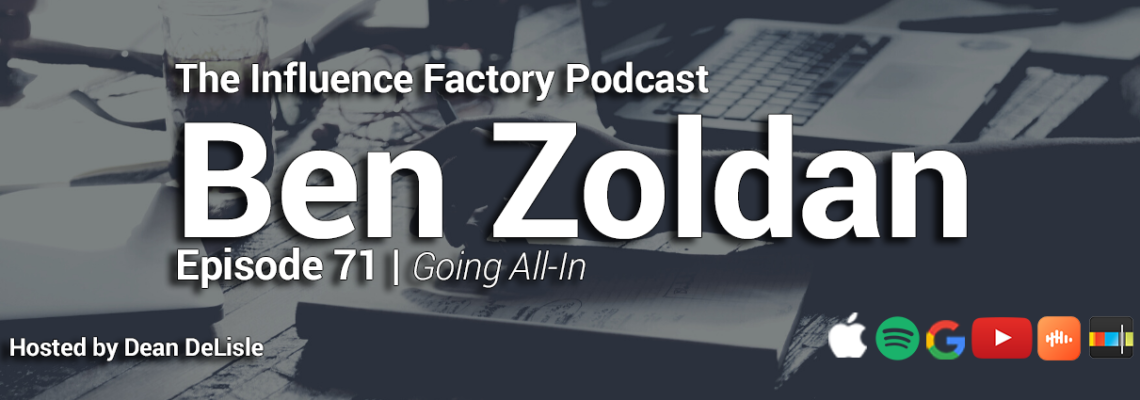In Episode 71 of the Influence Factory, I had the opporunity to sit down with my close friend and business partner, Ben Zoldan co-founder and CEO of Storyleaders.I welcome you to a discussion with us about “All-In” culture and what it means to see opportunity in fear, and more importantly what impact does it have in your organization, people and even our world.

The first area we focus on here is the idea of being present. If you are constantly looking towards the next thing, you are not allowing yourself to live in the experience of now. Constantly looking for the next thing trains your brain to do this even when you don’t intentionally mean to. This can, over time, hinder relationships in the sense of work as well as family.
When you grow up learning certain defense mechanisms, they become ingrained in your behavior for the rest of your life. It is up to you to unlearn these techniques to make room for growth. An interaction I had changed the way I looked at fear and how it affected my professional growth.

“Your problem is that you see fear as the enemy. When fear comes up, you need to see that as an opportunity, embrace it full-on, and go at it– whatever that fear maybe.” By doing this, you are opening the door to opportunities you would have never dreamed of. Nothing is out of your reach when you realize this. Ben points out that we are not fearless by nature; the closest we come to being fearless is when we effectively learn how to manage our fear and turn it into opportunity. At that point, we can cross the boundaries of fearlessness.

Ben goes on to discuss questions that were sparked within him when he went up to a man to thank him for his work, and he replies with, “Hey man I’m just doing my part.” It makes you wonder why some people are all-in, and others are not. A successful operation is made when all members are in for the good of the project rather than the material, monetary, and selfish reasons. The root of the problem comes from, in Ben’s eyes, “Corporate environments we set up that are operating from a playbook that fails to celebrate the most intrinsic things that govern our souls. This includes being stimulated, being a part of something greater, or working for something truly important to them. People don’t go “All-In” because of the out of date paradigms corporations have set up.”

For Ben, it was starting Storyleaders and diving into something that he was completely invested in. His passion, his drive, and his motives were “All-In” when it came to this project. He stated that maybe even if he wasn't the absolute best at it, it was about overcoming the fear and putting yourself in a position where you are truly passionate about the job you are doing.
When you can effectively communicate your story to your team and open the door to a vulnerable state, it creates a sense of community, understanding, and most importantly, humanization. With an open atmosphere, there is a greater potential for the team to have accountability and drive, due to viewing each other more as fellow humans with the same goals, rather than just coworkers.

“By and large, I felt like I knew what I was getting into. I couldn’t have been more wrong…This is an experience that has forever changed how I view the world” – Barry Sowerwine, SVP Enterprise Sales, Tableau

Ben discusses the idea that the reason people act the way they do is because of the broken systems we are designing. If the office culture had always been “All-In” then we wouldn't have to go back and fix it. The thing that gives people purpose and meaning is a connection. You have to find connections with others to truly feel attached to the work.
One of our core human interests is to contribute. We are here to work together to create something greater. Ben mentions that what gives us the ability to work together in large numbers is the ability to empathize and have each other's backs. This does not necessarily make us unique, for wild animals also do this. What does make us unique, however, is that we can pick things up and imagine things that do not yet exist. Businesses fail to recognize, in most cases, that this is what makes us so inimitable. They do not foster creativity and fail to remember what it is like to be human.

On a sports team, there is a sense of looking out for one another. The defense must work with the offense to reach its goal. This is the mentality that should be carried into the office. To listen to this episode with @BenZoldan go to: https://app.socialjack.com/resource-items/ep-71-ben-zoldan-going-all-in-influence-factory/



